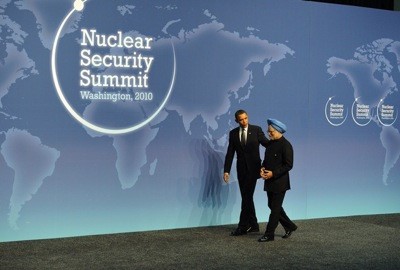 New Delhi, October 27.-- Ahead of US President Barack Obama's visit to India beginning November 6, India has signed on to the multilateral Convention on Supplementary Compensation for Nuclear Damage (CSC), in a bid to reassure foreign suppliers of nuclear reactors and technological equipment that any liabilities they face would be in tune with international norms.
New Delhi, October 27.-- Ahead of US President Barack Obama's visit to India beginning November 6, India has signed on to the multilateral Convention on Supplementary Compensation for Nuclear Damage (CSC), in a bid to reassure foreign suppliers of nuclear reactors and technological equipment that any liabilities they face would be in tune with international norms.
India's Parliament had, in August, approved legislation that would open up the domestic atomic power market to international suppliers, but its stringent nuclear liability law was viewed with concern by international companies who questioned the right to seek damages from suppliers in the event of a nuclear accident.
India's Ambassador in Austria, Dinkar Khullar, signed the CSC on Wednesday at the headquarters of the International Atomic Energy Agency, the U.N's. nuclear watchdog in Vienna. The CSC, which clearly sets out parameters on a nuclear operator's liability will, however, not overtake domestic legislation, senior officials have clarified. The international convention provides for compensation in case of trans-national implications of a nuclear accident and has been signed by 14 countries, including India. However, only four countries-- the US, Argentina, Morocco and Romania have ratified the Convention so far. India's Parliament would need to ratify the Convention before it becomes operable in this country.
India's domestic nuclear liability legislation has been viewed with concern even by traditional suppliers like Rosatom of Russia and western nuclear technology suppliers like Areva in France and General Electric and Westinghouse Electric, a U.S.-based unit of the Japanese Toshiba group, and officials from the Indian Department of Atomic Energy have been meeting with suppliers to allay some of these concerns. According to official sources, India's signing of the CSC will further allay concerns and facilitate the entry of multinational corporations into the domestic atomic power sector, valued at over 100 billion dollars. In the absence of one major "big ticket" item like the India-US civil nuclear agreement during the former President George W Bush visit, there is considerable pressure on both countries to notch up a set of "deliverables" during the Obama visit to make it a "success".
Washington had urged India to sign the CSC to ensure that President Obama's visit, along with around 100 CEO's of US companies, would result in some big ticket economic agreements being signed.
Diplomatic sources confirmed that the step was a "positive" one, and would help facilitate the review of export controls (on potential dual use technologies) to Indian goods and companies like the Indian Space Research Organisation (ISRO) and the Defence Research and Development Organisation (DRDO).
In the run-up to the Obama visit, US diplomatic sources have been at pains to stress the "indispensible" nature of the India - US relationship and have said that the truly "big ticket" of the forthcoming visit is that President Obama and Prime Minister Manmohan Singh envision a set of shared values, shared benefits and a shared vision of the future of the relationship.